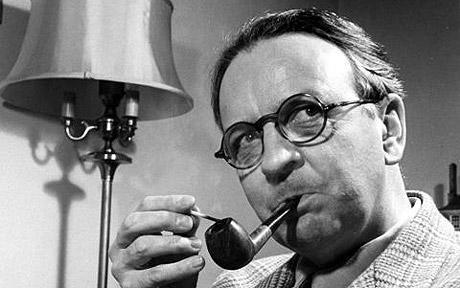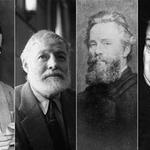Writing crime fiction: Finding the writer to inspire your own creativity
Writers should study an author whose work sparks them creatively. Mine is Raymond Chandler

Whenever I start writing a new book, I re-read some Raymond Chandler. The books I write don't turn out much like Chandler in the end. But I repeat this process because his writing sparks me creatively. Every writer should have an author whose work does this for him. Here's how it works for me.
Not long ago I picked The Long Goodbye off the shelf, because it’s my favorite. From the very first page, where Marlowe finds Terry Lennox falling drunk out of a Rolls Royce Silver Wraith in front of a club called The Dancers, I find myself hooked once again:
“The girl gave him a look which ought to have stuck at least four inches out of his back. It didn’t bother him enough to give him the shakes.”
One day I may write something that good. While I'm waiting, I recline with Chandler and my little orange notebook, reading one of his concrete images -- and an image of my own springs into my head. The image that comes to me is nothing like Chandler's, but I know it appeared because I was reading Chandler. It doesn't happen with other writers. Not even Hammett.
There are characteristics of a work of art that work on us indefinably and subconciously. Take Mozart, about whom I wrote my historical thriller Mozart's Last Aria. Numerous studies have shown that his music can effect the brain. It helps ADD kids concentrate in class. It prevents epileptic seizures. But the same thing's untrue of, say, Beethoven. Some quality in Mozart's music has a unique effect on the brain.
Every one of us has a writer out there who can provide the Mozartean music to our creativity. For me it's Chandler. You have to find yours by trial and error.
Along with Hammett, Chandler did everything for American literature that people always assume Hemingway did: made things simple, direct, tough and stark. But unlike Hemingway (and like Hammett), Chandler had the gruff sense of humor of a man who didn’t buy into the system. He wasn’t a Communist like Hammett, but he’d lived in England and been in the Canadian airforce, and he'd been around a while before he started writing.
That’s why he wrote crime novels. It’s an outsider’s genre, the writing venue of a man or woman who sees through things and yet remains positive enough to bother putting pen to paper.
Chandler, like Marlowe, seems to have “felt as out of place as a cocktail onion on a banana split.” Frequently, so have I, when I’ve been among the corporate or the gilded of this world –– and I have spent many an uncomfortable day, month or year in those scurrilous circles. That, in fact, may be why I’m a writer. Certainly it helps me cope with the weird status a writer holds today, threatened and undervalued, and yet cherished (though not always enough for someone to buy your book and pay for your
kids to go to college.)
Which writer will you find to do this for you? Who's going to worm his/her way into your brain and open the creative stream?
Related articles across the web
 Authors' Favorite First Lines of Books
Authors' Favorite First Lines of Books
 Ellroy and Hammett: The Tory and the Communist
Ellroy and Hammett: The Tory and the Communist
 The myth of the drinking writer
The myth of the drinking writer
 Raymond Chandler: The Master of Nasty
Raymond Chandler: The Master of Nasty
 Who is the greatest American novelist? 1: Saul Bellow v Raymond Chandler
Who is the greatest American novelist? 1: Saul Bellow v Raymond Chandler

Whenever I start writing a new book, I re-read some Raymond Chandler. The books I write don't turn out much like Chandler in the end. But I repeat this process because his writing sparks me creatively. Every writer should have an author whose work does this for him. Here's how it works for me.
Not long ago I picked The Long Goodbye off the shelf, because it’s my favorite. From the very first page, where Marlowe finds Terry Lennox falling drunk out of a Rolls Royce Silver Wraith in front of a club called The Dancers, I find myself hooked once again:
“The girl gave him a look which ought to have stuck at least four inches out of his back. It didn’t bother him enough to give him the shakes.”
One day I may write something that good. While I'm waiting, I recline with Chandler and my little orange notebook, reading one of his concrete images -- and an image of my own springs into my head. The image that comes to me is nothing like Chandler's, but I know it appeared because I was reading Chandler. It doesn't happen with other writers. Not even Hammett.
There are characteristics of a work of art that work on us indefinably and subconciously. Take Mozart, about whom I wrote my historical thriller Mozart's Last Aria. Numerous studies have shown that his music can effect the brain. It helps ADD kids concentrate in class. It prevents epileptic seizures. But the same thing's untrue of, say, Beethoven. Some quality in Mozart's music has a unique effect on the brain.
Every one of us has a writer out there who can provide the Mozartean music to our creativity. For me it's Chandler. You have to find yours by trial and error.
Along with Hammett, Chandler did everything for American literature that people always assume Hemingway did: made things simple, direct, tough and stark. But unlike Hemingway (and like Hammett), Chandler had the gruff sense of humor of a man who didn’t buy into the system. He wasn’t a Communist like Hammett, but he’d lived in England and been in the Canadian airforce, and he'd been around a while before he started writing.
That’s why he wrote crime novels. It’s an outsider’s genre, the writing venue of a man or woman who sees through things and yet remains positive enough to bother putting pen to paper.
Chandler, like Marlowe, seems to have “felt as out of place as a cocktail onion on a banana split.” Frequently, so have I, when I’ve been among the corporate or the gilded of this world –– and I have spent many an uncomfortable day, month or year in those scurrilous circles. That, in fact, may be why I’m a writer. Certainly it helps me cope with the weird status a writer holds today, threatened and undervalued, and yet cherished (though not always enough for someone to buy your book and pay for your
kids to go to college.)
Which writer will you find to do this for you? Who's going to worm his/her way into your brain and open the creative stream?
Related articles across the web
 Authors' Favorite First Lines of Books
Authors' Favorite First Lines of Books  Ellroy and Hammett: The Tory and the Communist
Ellroy and Hammett: The Tory and the Communist  The myth of the drinking writer
The myth of the drinking writer  Raymond Chandler: The Master of Nasty
Raymond Chandler: The Master of Nasty  Who is the greatest American novelist? 1: Saul Bellow v Raymond Chandler
Who is the greatest American novelist? 1: Saul Bellow v Raymond Chandler
Published on February 05, 2014 04:35
•
Tags:
crime-fiction, raymond-chandler, writing, writing-tips
No comments have been added yet.



